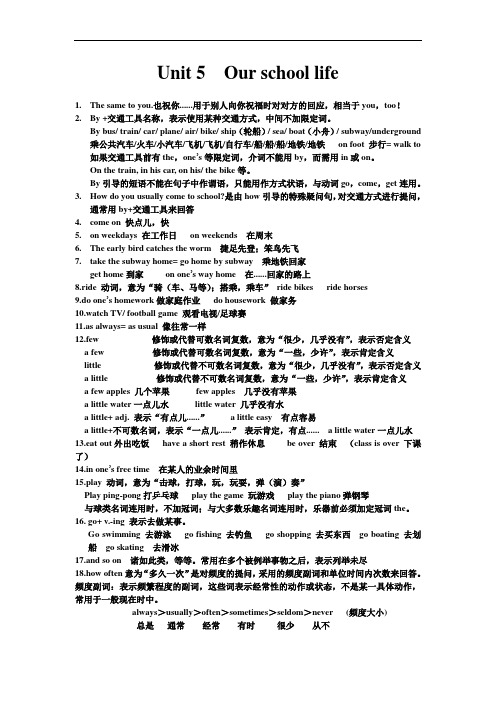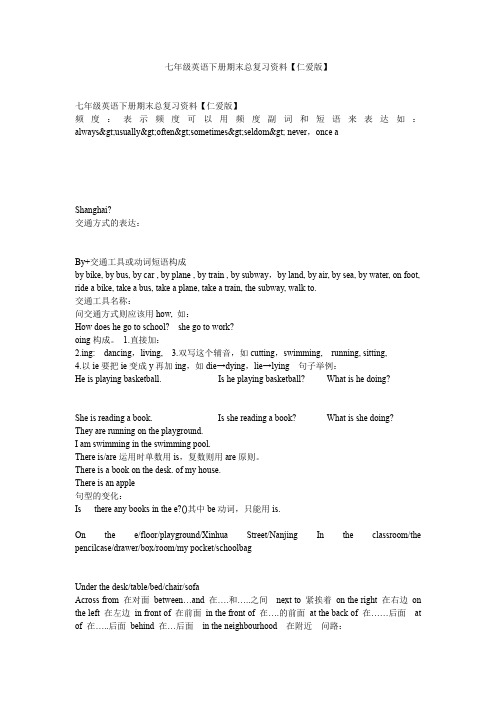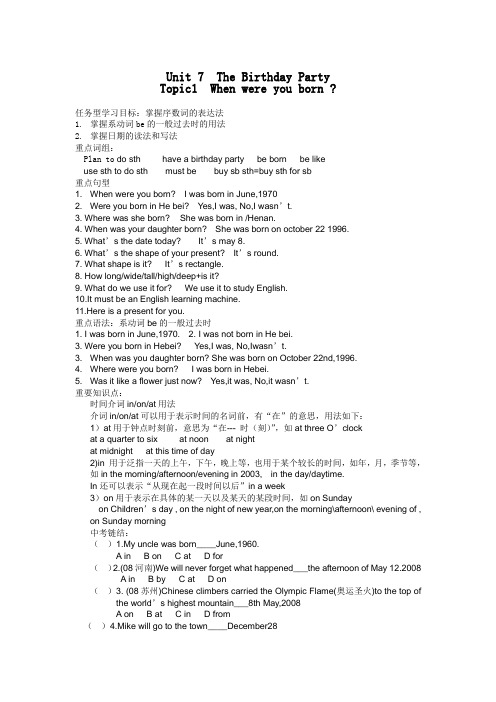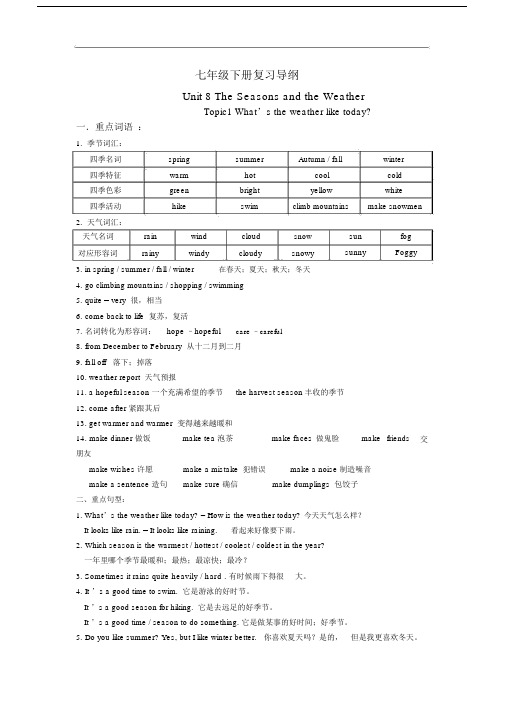【推荐】仁爱英语七年级下册总复习资料
(完整版)仁爱版英语七年级下全部知识点总结.doc

七年级下英语知识点总结Unit 5 Topic1㈠短语总结1.在学校大门口 at the school gate2.来学校come to school3. 去学校go to school4. 上课have class / have classes5. 步行on foot6.骑自行车ride a bike/ ride bikes/ by bike / on a bike7.坐公交by bus / take a bus8.坐地铁by subway / take the subway / on the subway9.坐飞机by plane/ take the plane / on the plane10.坐小汽车by car / in a car/ take a car/ drive a car11. 坐轮船by ship12. 坐小船by boat13. 坐火车by train / on the train14. 在我们组in our group15.一群学生a group of students16.我们中的三个人 three of us17.在平日 on weekdays18.在周末 on the weekends / at weekends19.起床 get up20.睡觉 go to bed21.早起 get up early22.回家 go home23.到家 get home24.去动物园 go to the zoo25.去公园 go to the park26.看电影 see a movie / film27.看电视 watch TV28.在晚上 in the evening / at night29.帮助父母 help parents30.做某人的家庭作业 do one’s ( my/ her/ his/ your/ their)homework31.在学校 at school32.知道 ,了解 know about / learn about33.校园生活 school life34.一个美国学生 an American student35.在美国 in America / in the U.S.A.36.许多学生 many students/ a lot of students/ lots of students37.很少 very few38.吃午饭 have lunch39.出去吃饭 eat out40.在校期 on school days41.休息一会 have a short rest/ break42.午后 after lunch43.在某人的余 in one’s ( my/ his/ her/ their⋯)free/ spare time44.打球 play basketball45.踢足球 play soccer / football46.琴 play the piano47.吉他 play the guitar48.拉二胡 play erhu49.去游泳 go swimming / go for a swim50.去划船 go boating51.球 a ball game / ball games52.一年四次 four times a year53.听音 listen to music54.read books55.看 read newspapers56.看医生 see a doctor57.去 go to the library58.一周两次 twice a week59.朋友 meet friends60.每天 every day61.在七点半 at half past seven62.一小会 for a little while / for a short time63.晚后 after supper64.吃 have dinner65.吃早 have breakfast㈡重要句型1.I usually come to school by subway.同句 : I usually take the subway to school.划部分提 : How do you usually come to school?似的有:go to school by bike=go to schoolon a bike= ride a bike to school=ride to schoolgo home by bus=go home on a bus=take a bus home2.How do you usually/ often⋯?你通常 /常怎⋯?3.It ’stime for class.=It’s time to have class. =It’s time for having class.4.What about you? =How about you?5.How often ⋯? 率,回答可以用率副: always, usually, often,sometimes, seldom, never, every day ,every +其他名或表示率的短回答表示率的短:次数 +位e.g. : once a day / twice a week / three times a month6.The early bird catches the work. ( ) 笨先7.Work / Study must come first. 工作 / 学必放在第一位!8. Classes begin at eight. =Class begins at eight.提问:What time does the class begin? / What time do the classes begin?㈢重要单词的用法1.look (感官动词 ) 看起来,后面加形容词His mother looks very young.They look very cute.Her dress looks very nice.You look very cool in this coat.2. by 介词by 后面直接加表示交通工具的名词,中间不用任何词修饰,如: by bike by +动词 ing 形式,表示通过某种方式People show love to their mothers by giving cards.You can be a good student by working hard.3.over (形容词 ) School/ Class is over.4.begin现在分词 : beginning 过去式 : beganbegin to do sth , begin doing sthHe begins to write a letter. =He begins writing a letter.如果 begin 本身为分词,只能用begin to do sthHe is beginning to run.5.listen to 听(动作), hear 听见 (结果 )6.always 反义词 never7.本话题涉及的时态为一般现在时,句中常有频率副词或表示频率的短语,如果主语为三单,动词一定要用三单!(四)易错题1.You new watch ______ (look) very nice!2.Here ______(be) some news.3.Oh, come on! It’s time_____ going to school.4.They usually go to school on ________(feet).5.In my class, forty of _______(we) go to school by bike.6.The early bird ______ (catch) the worm.7.Kangkang often _____ (ride) a bike to the park.8.What time _____ (be)school over?9.Work must come ______(once).10.It ’stime ____you to get up.11.We often _____ books in the morning.12.Jill ’s friend like ______(study) in our school.13.Mr. Wang teaches ______(we) English. _____ of us like him.14.How about ______(go) out with me?15.Most students go to school _____ the school bus.16._______ do you go shopping with your mother?A. How soonB. How farC. How oftenD. How much17. What time do you usually get up _____ weekdays?18. He ______ busy, so he has no time to play with us.A. is alwaysB. seldom isC. always isD. often is19.The last class______(finish) at twelve o’clock.20.Let’s go______(boat).21.It’stime to have breakfast. 同(义句 )______________________________________________________.22.Michael often rides a bike to school. 同(义句 )______________________________________________________.23.I always go to work on foot. (对划线部分提问 )______________________________________________________.24.My mother goes shopping twice a week. 对(划线部分提问 )______________________________________________________.25.Mary always reads books in the library. 反(义句 )______________________________________________________.26.He usually does his homework at school.否(定句 )______________________________________________________.27.They often go to school by bus in the morning. 对(划线部分提问 ) ______________________________________________________.28.Jane seldom watches TV on weekdays改.(为一般疑问句 )______________________________________________________.29.He usually has lunch at home. 对(划线部分提问 )______________________________________________________.30.Li Ping often goes to work on foot. (同义句 )______________________________________________________.31.几乎没有学生乘地铁去学校。
(完整版)仁爱版七年级英语下册知识点总结

Unit 5 Our school life1.The same to you.也祝你......用于别人向你祝福时对对方的回应,相当于you,too!2.By +交通工具名称,表示使用某种交通方式,中间不加限定词。
By bus/ train/ car/ plane/ air/ bike/ ship(轮船)/ sea/ boat(小舟)/ subway/underground 乘公共汽车/火车/小汽车/飞机/飞机/自行车/船/船/船/地铁/地铁on foot 步行= walk to 如果交通工具前有the,one’s等限定词,介词不能用by,而需用in或on。
On the train, in his car, on his/ the bike等。
By引导的短语不能在句子中作谓语,只能用作方式状语,与动词go,come,get连用。
3.How do you usually come to school?是由how引导的特殊疑问句,对交通方式进行提问,通常用by+交通工具来回答e on 快点儿,快5.on weekdays 在工作日on weekends 在周末6.The early bird catches the worm 捷足先登;笨鸟先飞7.take the subway home= go home by subway 乘地铁回家get home到家on one’s way home 在......回家的路上8.ride 动词,意为“骑(车、马等);搭乘,乘车”ride bikes ride horses9.do one’s homework做家庭作业do housework 做家务10.watch TV/ football game 观看电视/足球赛11.as always= as usual 像往常一样12.few 修饰或代替可数名词复数,意为“很少,几乎没有”,表示否定含义a few 修饰或代替可数名词复数,意为“一些,少许”,表示肯定含义little 修饰或代替不可数名词复数,意为“很少,几乎没有”,表示否定含义a little 修饰或代替不可数名词复数,意为“一些,少许”,表示肯定含义a few apples 几个苹果few apples 几乎没有苹果a little water一点儿水little water 几乎没有水a little+ adj. 表示“有点儿......” a little easy 有点容易a little+不可数名词,表示“一点儿......”表示肯定,有点...... a little water一点儿水13.eat out外出吃饭have a short rest 稍作休息be over 结束(class is over 下课了)14.in one’s free time 在某人的业余时间里15.play 动词,意为“击球,打球,玩,玩耍,弹(演)奏”Play ping-pong打乒乓球play the game 玩游戏play the piano弹钢琴与球类名词连用时,不加冠词;与大多数乐趣名词连用时,乐器前必须加定冠词the。
(完整)仁爱版英语七年级下全部知识点总结,推荐文档

七年级下英语知识点总结Unit 5 Topic1㈠短语总结1.在学校大门口at the school gate2.来学校come to school3.去学校go to school4.上课have class / have classes5.步行on foot6.骑自行车ride a bike/ ride bikes/ by bike / ona bike7.坐公交by bus / take a bus8.坐地铁by subway / take the subway / onthe subway9.坐飞机by plane/ take the plane / on theplane10.坐小汽车by car / in a car/ take a car/ drive acar11.坐轮船by ship12.坐小船by boat13.坐火车by train / on the train14.在我们组in our group15.一群学生 a group of students16.我们中的三个人three of us17.在平日on weekdays18.在周末on the weekends / at weekends19.起床get up20.睡觉go to bed21.早起get up early22.回家go home23.到家get home24.去动物园go to the zoo25.去公园go to the park26.看电影see a movie / film27.看电视watch TV28.在晚上in the evening / at night29.帮助父母help parents30.做某人的家庭作业do one’s ( my/ her/ his/your/ their)homework31.在学校at school㈡重要句型1. I usually come to school by subway.同义句: I usually take the subway to school.对划线部分提问: How do you usually come to school? 32.知道,了解know about / learn about33.校园生活school life34.一个美国学生an American student35.在美国in America / in the U.S.A.36.许多学生many students/ a lot of students/ lotsof students37.很少very few38.吃午饭have lunch39.出去吃饭eat out40.在校期间on school days41.休息一会have a short rest/ break42.午饭后after lunch43.在某人的业余时间in one’s( my/ his/ her/their…)free/ spare time44.打篮球play basketball45.踢足球play soccer / football46.弹钢琴play the piano47.弹吉他play the guitar48.拉二胡play erhu49.去游泳go swimming / go for a swim50.去划船go boating51.球赛a ball game / ball games52.一年四次four times a year53.听音乐listen to music54.读书read books55.看报read newspapers56.看医生see a doctor57.去图书馆go to the library58.一周两次twice a week59.见朋友meet friends60.每天every day61.在七点半at half past seven62.一小会for a little while / for a short time63.晚饭后after supper64.吃饭have dinner65.吃早饭have breakfastgo to school by bike=go to schoolon a bike= ride a bike to school=ride to schoolgo home by bus=go home on a bus=take a bus home2.How do you usually/ often…?你通常/经常怎样…?3.It’s time for class.=It’s time to have class. =It’stime for having class.4.What about you? =How about you?5.How often …?询问频率,回答可以用频率副词:always, usually, often, sometimes, seldom, never, every day ,every +其他时间名词或表示频率的短语回答表示频率的短语:次数+单位时间e.g. : once a day / twice a week / three times a month6.The early bird catches the work. (谚语) 笨鸟先飞7.Work / Study must come first. 工作/ 学习必须放在第一位!8.Classes begin at eight. =Class begins at eight.提问:What time does the class begin? / What time do the classes begin?㈢重要单词的用法1. look (感官动词) 看起来,后面加形容词His mother looks very young.They look very cute.Her dress looks very nice.You look very cool in this coat.1.You new watch (look) very nice!2.Here (be) some news.3.Oh, come on! It’s time going to school.4.They usually go to school on (feet).5.In my class, forty of (we) go to schoolby bike. 2.by 介词by 后面直接加表示交通工具的名词,中间不用任何词修饰,如:by bikeby +动词ing 形式,表示通过某种方式People show love to their mothers by giving cards.You can be a good student by working hard. 3.over ( 形容词)School / Class is over.4.begin现在分词: beginning 过去式: beganbegin to do sth , begin doing sthHe begins to write a letter. =He begins writing a letter.如果begin 本身为分词,只能用begin to do sthHe is beginning to run.5.listen to 听(动作),hear 听见(结果)6.always 反义词never7.本话题涉及的时态为一般现在时,句中常有频率副词或表示频率的短语,如果主语为三单,动词一定要用三单!(四)易错题us.A. is alwaysB. seldom isC. always isD. often is19.The last class (finish) at twelve o’clock.20.Let’s go (boat).21.It’s time to have breakfast. (同义句)6.The early bird (catch) the worm.7.Kangkang often (ride) a bike to the park. .8.What time (be)school over? 22. Michael often rides a bike to school. (同义句)9.Work must come (once).10.It’s time you to get up.11.We often books in the morning..23. I always go to work on foot. (对划线部分提问)12.Jill’s friend like (study) in our school.13.Mr. Wang teaches (we) English. .of us like him.14.How about (go) out with me? 24.My mother goes shopping twice a week. ( 对划线部分提问)15.Most students go to school the school bus.16.do you go shopping with your mother?A. How soonB. How farC. How oftenD. How much.25.Mary always reads books in the library. (反义句)17.What time do you usually get up .weekdays?18.He busy, so he has no time to play with 26.He usually does his homework at school. (否定句).27.They often go to school by bus in the morning.(对划线部分提问)(一) 重要单词:Unit5 Topic2.28.Jane seldom watches TV on weekdays. (改为一般疑问句).29.He usually has lunch at home. (对划线部分提问).30.Li Ping often goes to work on foot. (同义句).31.几乎没有学生乘地铁去学校。
仁爱英语七年级下册总复习资料

仁爱英语七年级下册总复习资料七年级英语(仁爱版)下册复习教案Unit 5 Our School Life任务形学习目标:1.掌握并能熟练运用表达交通方式的句型。
2.掌握频度副词的表达方式。
3.掌握一般现在是的用法。
重点词语:1.兼类词:early walk ride watch American rest play swim2.多意词:by乘车 by train\ subway靠近,在------的旁边by the fireplace在------时间 by the time被That card was made by Lucy.用by hand由People show their love to their mothers by giving cards and other presents.(1) 词组1. wake up2. take a subway3. ride a bike4. get to school5. have a shot break6. play basketball7. play computer games8. play the piano9. listen to music 10. go roller skating 11. write letters 1.at the school gate 2. at around six o’clock 3. on weekends = on the weekend 4.on weekdays 5.in one’s spare time 6. after lunch\breakfast\supper7.after school \class 8.a little while9.ONCE\TWICE\THREE TIME A WEEK------HOW OFTEN重点句型1. How do you usually come to school?(by bus \bike\ subway\ car\ train\ ship, on foot, on my bike, on a bus, in a car---)Do you often come to school by bike?2. How often do you go to library?(always\ usually\ often\ sometimes\ seldom\ never\ ---)3. What time do you get up on weekdays?4. You must go to school early.5. Your new bike looks very nice!6. They often play basketball or football, go swimming and so on.7. Work must come first8. She likes English best.9. The early bird catches the worm.10. It’s time for sb.to do sthIt’s time for + n.要点讲解1.如何正确乘坐交通工具(主要有两种表达方法:介词表达方法和动词表达方法)by +交通工具单词,且其前不加冠词,名词也不能用复数 on + the \ a \ +交通工具单词in + the \ a \ one’s cartake the\a bus \train\subway to--- = go or come to a place by busride the\a bike to school = come to school by bikewalk to the park = go to the park on footfly to a place = go to a place by plane2.区别下列特殊疑问词How often 多久一次,是提问频率的疑问词,回答常用频率副词,常与一般现在时连用。
七年级英语下册期末总复习资料【仁爱版】

七年级英语下册期末总复习资料【仁爱版】七年级英语下册期末总复习资料【仁爱版】频度:表示频度可以用频度副词和短语来表达如:always>usually>often>sometimes>seldom> never,once aShanghai?交通方式的表达:By+交通工具或动词短语构成by bike, by bus, by car , by plane , by train , by subway,by land, by air, by sea, by water, on foot, ride a bike, take a bus, take a plane, take a train, the subway, walk to.交通工具名称:问交通方式则应该用how, 如:How does he go to school? she go to work?oing构成。
1.直接加:2.ing: dancing,living,3.双写这个辅音,如cutting,swimming, running, sitting,4.以ie要把ie变成y再加ing,如die→dying,lie→lying 句子举例:He is playing basketball. Is he playing basketball? What is he doing?She is reading a book. Is she reading a book? What is she doing?They are running on the playground.I am swimming in the swimming pool.There is/are运用时单数用is,复数则用are原则。
There is a book on the desk. of my house.There is an apple句型的变化:Is there any books in the e?()其中be动词,只能用is.On the e/floor/playground/Xinhua Street/Nanjing In the classroom/the pencilcase/drawer/box/room/my pocket/schoolbagUnder the desk/table/bed/chair/sofaAcross from 在对面between…and 在….和…..之间next to 紧挨着on the right 在右边on the left 在左边in front of 在前面in the front of 在….的前面at the back of 在……后面at of 在…..后面behind 在…后面in the neighbourhood 在附近问路:Is there a post office near here?Where is the post office ,please ?How can I get to post office?指路:It’s over there .to the end.时间表达:几点:介词at+点钟(几点的表达有两种,顺读和逆读,逆读有两种情况,一用past,小于或等于30分时,二用to,大于30分时,此时整点部分应该加1)如:at six at twelve at ten past eight at a quarter past eighthalf past eight fifteen to eleven 注:顺读:10:40 ten forty哪天:用介词on+星期或日期(日期的表达,英式是:the+序数词的日+of+月份,美式是:月份+the+序数词的日)如:on Monday on Friday on April the tenth on the ninth of April序数词:first第一second第二third第三fifth eighth第八ninth第九twelfth第十二twentieth第二十twenty-first第二十一twenty-second 第二十二twenty-third哪年、哪月、哪个季节:介词用in 读)In 1996——in nineteen ninety-six谈论能力:使用情态动词can do sth. Sb can’t do sthCan sb do sth?动词过去式变1. watched looked2. lived loved liked danced3.y为i ,ed worried carried5. A—A A—B 型was are——were have/has——had go——went did+动词的过去式+其它。
新版仁爱英语七年级下册总复习资料

Unit 5 Our School LifeTopic 1 I usually come to school bu subway。
重点短语1. on foot go …on foot = walk ( to )…2.by plane/ship/bus/subway3. on weekdays 在平日5. after school 放学后6. in their free time 在空闲时间7. have a rest 休息一下 8. do(one’s) homework 做作业9. once a week 一周一次10. have classes 上课11. at the school gate 在校门口 12. come on 快点、加油13. Talkwith to sb.与某人谈话 14.for a short time 一会儿15.know about 了解语法:表时间频率的副词:never 从来不 seldom 极少 sometimes 有时 often 经常usually 常常 always 总是四. 重要句型1. Happy New Year! The same to you.2. Your new bike looks very nice. Thank you.3. How do you usually come to school ? By bus / car / bike. On foot.4. It’s time for class. = It’s time to have class. 该是上课的时候了。
5. The early bird catches the worm. 笨鸟先飞。
/ 捷足先登。
6. We have no more time. 我们没有更多的时间了。
7. She goes to bed at about a quarter to ten.她九点四十五分睡觉。
仁爱英语七年级下册总复习资料

Unit 7 The Birthday PartyTopic1 When were you born ?任务型学习目标:掌握序数词的表达法1.掌握系动词be的一般过去时的用法2.掌握日期的读法和写法重点词组:Plan to do sth have a birthday party be born be likeuse sth to do sth must be buy sb sth=buy sth for sb重点句型1. When were you born? I was born in June,19702. Were you born in He bei? Yes,I was, No,I wasn’t.3. Where was she born? She was born in /Henan.4. When was your daughter born? She was born on october 22 1996.5. What’s the date today? It’s may 8.6. What’s the shape of your present? It’s round.7. What shape is it? It’s rectangle.8. How long/wide/tall/high/deep+is it?9. What do we use it for? We use it to study English.10.It must be an English learning machine.11.Here is a present for you.重点语法:系动词be的一般过去时1. I was born in June,1970.2. I was not born in He bei.3. Were you born in Hebei? Yes,I was, No,Iwasn’t.3. When was you daughter born? She was born on October 22nd,1996.4. Where were you born? I was born in Hebei.5. Was it like a flower just now? Yes,it was, No,it wasn’t.重要知识点:时间介词in/on/at用法介词in/on/at可以用于表示时间的名词前,有“在”的意思,用法如下:1)at用于钟点时刻前,意思为“在--- 时(刻)”,如at three O’clockat a quarter to six at noon at nightat midnight at this time of day2)in 用于泛指一天的上午,下午,晚上等,也用于某个较长的时间,如年,月,季节等,如in the morning/afternoon/evening in 2003, in the day/daytime.In还可以表示“从现在起一段时间以后”in a week3)on用于表示在具体的某一天以及某天的某段时间,如on Sundayon Children’s day , on the night of new year,on the morning\afternoon\ evening of , on Sunday morning中考链结:()1.My uncle was born____June,1960.A inB onC atD for()2.(08河南)We will never forget what happened___the afternoon of May 12.2008A inB byC atD on()3. (08苏州)Chinese climbers carried the Olympic Flame(奥运圣火)to the top of the world’s highest mountain___8th May,2008A onB atC inD from()4.Mike will go to the town____December28Unit7 Top2复习教案一.知识网络梳理1.重点词组:at the birthday party在生日聚会上perform ballet跳芭蕾舞dance to disco 跳迪斯科take these flowers to 把这些花带去。
仁爱英语初一下册复习资料.doc

七年级下册复习导纲Unit 8 The Seasons and the WeatherTopic1 What’s the weather like today?一.重点词语:1.季节词汇:四季名词spring summer Autumn / fall winter 四季特征warm hot cool cold 四季色彩green bright yellow white 四季活动hike swim climb mountains make snowmen 2.天气词汇:天气名词rain wind cloud snow 对应形容词rainy windy cloudy snowy 3. in spring / summer / fall / winter在春天;夏天;秋天;冬天sun fog sunny Foggy4.go climbing mountains / shopping / swimming5.quite = very 很,相当e back to life 复苏,复活7. 名词转化为形容词:hope –hopeful care –careful8.from December to February 从十二月到二月9.fall off 落下;掉落10.weather report 天气预报11. a hopeful season 一个充满希望的季节the harvest season丰收的季节e after 紧跟其后13.get warmer and warmer 变得越来越暖和14. make dinner 做饭make tea 泡茶make faces 做鬼脸make friends 交朋友make wishes 许愿make a sentence 造句make a mistakemake sure 确信犯错误make a noise 制造噪音make dumplings 包饺子二、重点句型:1. What’s the weather like today? = How is the weather today?今天天气怎么样?It looks like rain. = It looks like raining.看起来好像要下雨。
- 1、下载文档前请自行甄别文档内容的完整性,平台不提供额外的编辑、内容补充、找答案等附加服务。
- 2、"仅部分预览"的文档,不可在线预览部分如存在完整性等问题,可反馈申请退款(可完整预览的文档不适用该条件!)。
- 3、如文档侵犯您的权益,请联系客服反馈,我们会尽快为您处理(人工客服工作时间:9:00-18:30)。
七年级英语(仁爱版)下册复习教案Unit 5 Our School Life任务形学习目标:1.掌握并能熟练运用表达交通方式的句型。
2.掌握频度副词的表达方式。
3.掌握一般现在是的用法。
Topic 1 How do you usually come to school ?二.重点短语:1. on foot go …on foot = walk ( to )…2. by + 交通工具“乘坐…” by bus / bike / plane / train / subway / ship / boat / car3.take the bus = go …by bus ride a bike = go …by bike take the subway = go …by subway4. on weekdays 在平日5. after school 放学后 after class 下课后after breakfast / lunch / supper早餐/ 午餐/ 晚餐后6. in their free time 在空闲时间7. have a rest 休息一下8. read books 读书 11. go swimming 去游泳 12. listen to music 听音乐 12. watch TV 看电视 13. do(one’s)homework 做作业 14. go to the zoo / park 去动物园/ 公园15. once a week 一周一次 16. every day 每天 17. have classes 上课 18. for a little while 一会儿 19. go to bed 上床睡觉 20. have breakfast / lunch / supper(dinner)吃早餐/ 午餐/ 晚餐 22. at the school gate 在校门口23. come on 快点、加油24. get up 起床 25. talk with / to sb.与某人谈话26. at school 在学校、在上课 27. go to school 去上学28. and so on ……等等三.语法:表时间频率的副词:never 从来不seldom 极少sometimes 有时often 经常usually 常常always 总是1. I never go to school by subway.2. I seldom walk to school.3. Maria sometimes takes the subway home.4. Li Xiang often rides a bike to school.5. We usually go to the park on foot.6. They always go to the zoo by bus.7. How often do you come to the library ? Very often / Twice a week / Once a week / Every day.四. 重要句型1. Happy New Year! The same to you.2. Your new bike looks very nice. Thank you.3. How do you usually come to school ? By bus / car / bike. On foot.4.It’s time for class. = It’s time to have class. 该是上课的时候了。
5. The early bird catches the worm. 笨鸟先飞。
/ 捷足先登。
6. We have no more time. 我们没有更多的时间了。
7. I have four classes in the morning and two in the afternoon.我早上上四节课,下午上两节。
8. She goes to bed at about a quarter to ten. 她九点四十五分睡觉。
Topic 2 He is running on the playground.二.重点短语:1. make cards 制作卡片 2. on the playground 在操场上 3. in the library 在图书馆4. in the gym在体育馆5. on the shelf在书架上(shelves 复数)6. at the Lost and Found 在失物招领处7.clean the room打扫房间8.have a soccer game 举行足球比赛9. have an English class 上英语课10. write a letter 写信11. some of his photos= some photos of his 他的一些照片12. on time 准时/in time及时14. do better in sth 在某方面做得较好15.put on 穿、戴上、上演(代词it / them放在中间,名词中间或后面,put it / them on )16. show sb. around… 令某人参观……三.语法:现在进行时态主语+ be(is / am / are )+ 动词ing + 其他。
表示正在进行或发生的动作。
常与now = at the moment 现在、look看、listen听等连用。
1. I’m looking for my purse.2. They aren’t sleeping at the moment.3. Are you doing your homework ? Yes, I am. No, I’m not.4. Is he / she singing now ? Yes, he / she is. No, he / she isn’t.5. What is your brother doing ? He is running in the gym.四. 重要句型1.Excuse me, may I borrow your story book ? Of course. = Sure. (borrow sth from…从……借回某物……)2. How Long may I keep the book ? Two weeks. ( keep 借用,后面常跟一段时间连用)3.You must return them on time. (return 归还,return sth to …把……归还给……)4. Thank you. It’s a pleasure. = A pleasure = My pleasure. 别客气。
5. Sorry, I don’t have any.Thank you all the same. 仍然感谢你。
6. See you soon. 回头见.7. What else ? 还有别的什么?(else 其他的、别的,常放在疑问词what/ where / who…和不定代词something/ somebody等的后面)Topic 3 My school life is very interesting.二.重点短语:1. outdoor activity 课外活动 2. easy and interesting 容易又有趣 3.difficult and boring 又难又乏味 4. be friendly to sb. =be kind to sb. 对某人友好5.between…and… 在……之间…6. learn…from… 向……学习……/ 从…中学……7. from…to… 从……到…… 8. in the morning / afternoon / evening 在早上/ 下午/ 晚上9.on Monday 在星期一on Monday morning在星期一的早上11. tell sb. about sth告诉某人关于某事三.语法:一般现在时主语+ 动词原形/ 动词第三人称单数s/es + 其他。
表示经常或习惯性的动作。
常与频率副词:never 从来不seldom 极少sometimes 有时often 经常usually 常常always 总是或every day 每天、in the morning / afternoon / evening 在早上/ 下午/ 晚上等连用。
例如:I often do my homework in the evening. I don’t often go shopping on Sunday.Do you usually come to school by car? Yes, I do. No, I don’t.Sometimes she watches TV in the evening. She doesn’t like Chinese.Does she often take a bus to school ? Yes, she does. No, she doesn’t.四. 重要句型1.What day is it today?It’s Sunday / Monday / Tuesday / Wednesday / Thursday / Friday / Saturday.(在英语国家每周的第一天是星期天而不是星期一)2. What class are they having ? They are having a music class.3. What time does the class begin ? At ten o’clock.4. What do you think of math? = How do you like math ? 你认为数学怎么样?It’s difficult and boring.5. Why (为什么)do you like English ? Because(因为)it’s easy and interesting.7.What subject (学科)do you like best ? I like history best.8. At school, my teachers and classmates are very friendly to me.9. I study Chinese, English, politics, geography and some other subjects.(other泛指其他的,别的+ 名词复数)10.English is my favorite (最喜欢的)subject. I also like P.E and music.= I like P.E and music , too. (也)11.Can you tell me something about it ?五.词语辨析a few 几个,一些 + 名词复数 a little 一点儿 +不可数名词many 许多+名词复数few几乎没有 little 几乎没有 much许多、大量的+不可数名词other泛指其他的,别的+ 名词复数another 泛指又一个、再一个、另一个+ 名词单数the other 两者中的另一个Unit 6 Our Local AreaTopic1 Is there a sofa in your study?一、学习目标1、掌握单词和重点词组2、掌握there be的各种形式及用法3、能熟练用英语描写房间、家庭、学校等建筑4、熟练掌握方位介词in, on, behind, under, near, next to, in front of二、重点词组On the first floor 美式英语一楼floor地板,此处指“楼房的层”。
